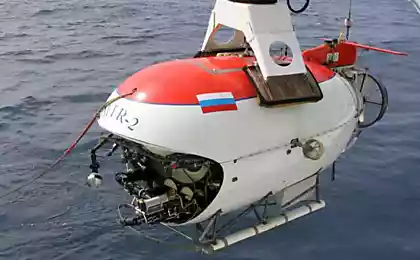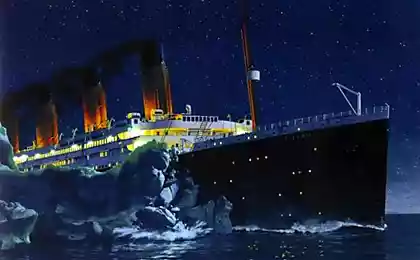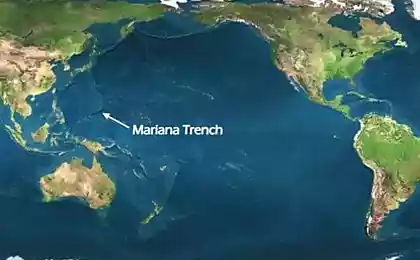645
Dive James Cameron
First psto can kick but it does not break, I will inform you about the end of
James Cameron set a world record for a single dive
A few days ago on a specially constructed single unit celebrated director came down to a depth of 8166 meters. And in the coming weeks he plans to visit the deepest point on Earth - the bottom of the Mariana Trench, where people have visited only once, with 52 years ago.
March 6th, 2012, the project Deepsea Challenge, James Cameron made a record single dive near Papua New Guinea.
It served as a crucial test for a unique single bathyscaphe Deepsea Challenger, designed to achieve the bottom of the Mariana Trench, in particular, its deepest point - the abyss Challenger (Challenger Deep), located at 10,994 meters below the sea surface (according to the measurements of 2011).
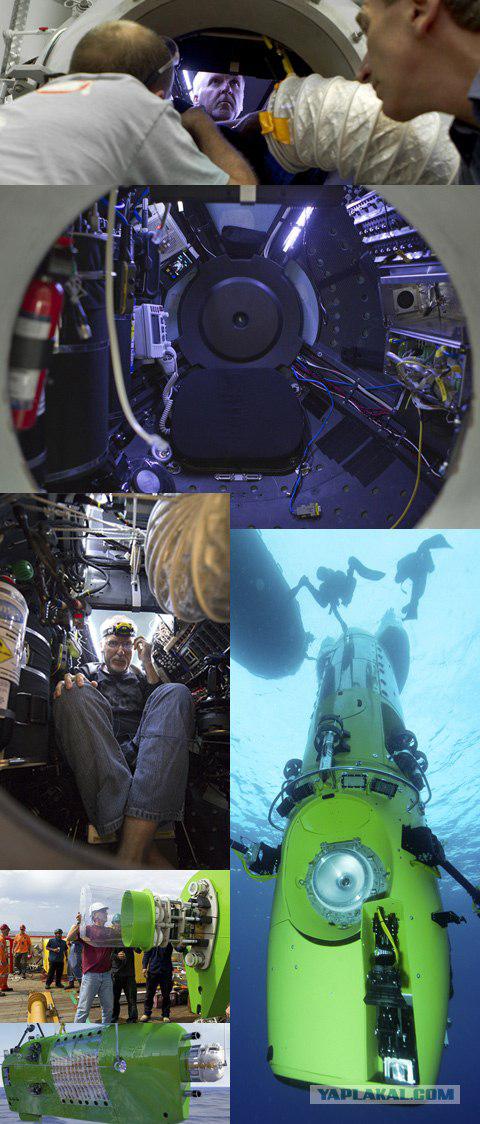
The construction of the unit Deepsea Challenger took eight years. This standalone bathyscaphe is a vertically oriented streamlined capsule height of 7, 3 meters and a weight of 10, 7 tons.
At the bottom of the machine is a spherical submarine manned compartment. Its internal diameter is 109 cm, the thickness of the steel walls - 6, 4 cm.
Interestingly, this area in the course of the test pressure checked twice 1160 kilograms per square centimeter. This value is higher than will be achieved on the ocean floor.
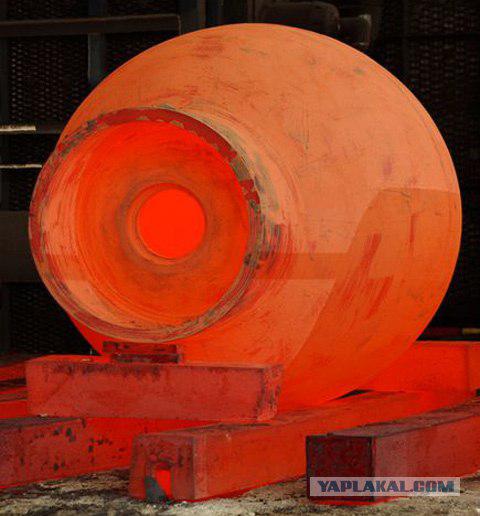
Cylinders with oxygen and carbon dioxide absorbers must submit pilot fresh air for 56 hours (this is obviously greater than the typical time of the mission).
The main part of the Deepsea Challenger (illustration Acheron Project).
Water jet 12 controlled by the joystick can provide Batiskaf horizontal speed unit 3 (5, 6 km / h), and vertical - 2, node 5. And it is only by motor.
Buoyancy control unit may give it a higher speed on the way up and down (for example, immersing it in the latter was 5, node 7).
To speed dive "Challenger" uses a metal dumped loads (steel plates with a total weight of 450 kg, plus a certain number of fractions), which are held on the surface of the body of an electromagnet. To start an intense rise enough to turn off the current. Perhaps a partial dropping of ballast to fine-tune the balance.
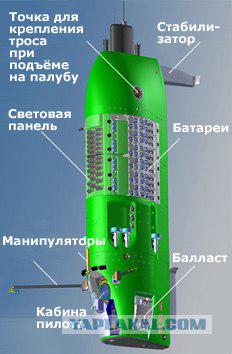
Without all of these goods vehicle has a large stock of positive buoyancy. For it to meet the unique heavy-duty foam ISOFLOAT, specially designed for the "Challenger" leading project engineer Allam Ron (Ron Allum).
Simply put, this foam consists of glass spheres, placed in a polymer resin. According to the project, ISOFLOAT twice stronger than all previous analogs used in submersibles, and can withstand full immersion in the 11 kilometers without breaking.
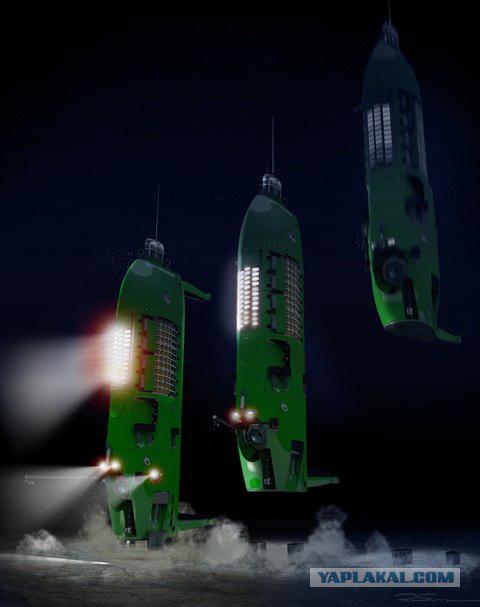
Interestingly, reset "piece of iron", there are several options. If disabling magnets for some reason does not work, you can use button to destroy the bolts holding the whole mechanism in the ballast housing.
In an extreme case, you can wait for a special corrosion corrode the wire holding the load. These wires are designed that are destroyed by 11-13 hours in sea water.
For communication with the mother ship on board the bathyscaphe has a system that can transmit underwater at a distance of 30 kilometers.
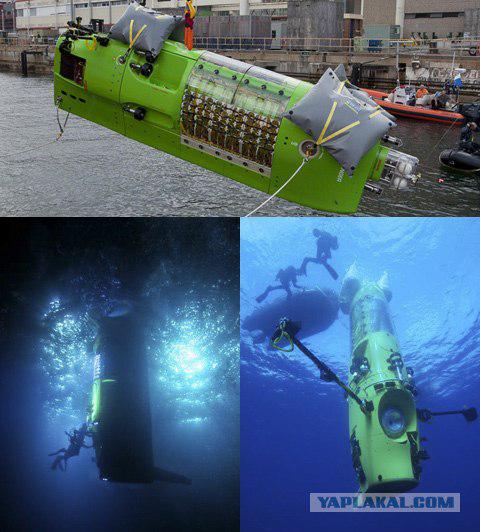
Deepsea Challenger is equipped with a video camera Red Epic 5K with a resolution of about 14 megapixels. By the way, the camera line of Red Epic used in the filming of the film "The Hobbit" and "The new Spider-Man," due out this year.
Located inside the Red Epic residential capsules and shoots through a single window in the machine, transferring the image onto a large screen in front of the eyes of the pilot. Also available in the cockpit camera, taking pictures of occupant vehicle (so the pilot can keep a video diary).
More bathyscaphe has four external HD-cameras installed in sealed enclosures outside. Two of them are paired for recording stereoscopic images, with this pair is mounted on the end of one of three hydraulic manipulators. The second holds a set of spotlights. And the third is equipped with a gripper for the collection of geological or biological samples.
In addition to the soffit body Deepsea Challenger is equipped with a large (almost 2, 5 meters tall) LED panel. In pure water, the light from this panel provides a sufficiently bright light at a distance of 30 meters.
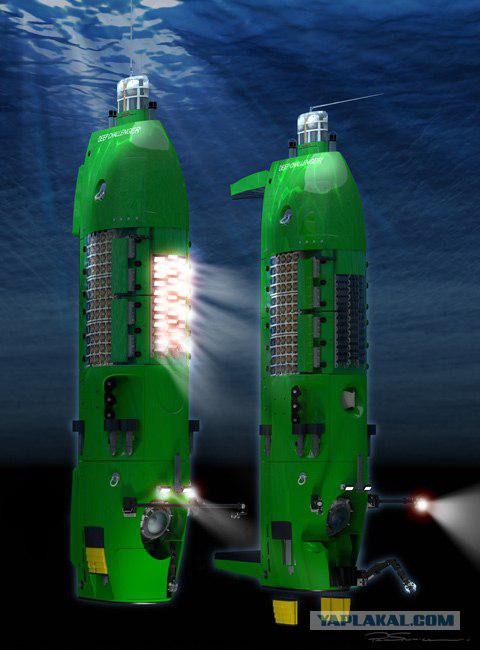
Source:
James Cameron set a world record for a single dive
A few days ago on a specially constructed single unit celebrated director came down to a depth of 8166 meters. And in the coming weeks he plans to visit the deepest point on Earth - the bottom of the Mariana Trench, where people have visited only once, with 52 years ago.
March 6th, 2012, the project Deepsea Challenge, James Cameron made a record single dive near Papua New Guinea.
It served as a crucial test for a unique single bathyscaphe Deepsea Challenger, designed to achieve the bottom of the Mariana Trench, in particular, its deepest point - the abyss Challenger (Challenger Deep), located at 10,994 meters below the sea surface (according to the measurements of 2011).

The construction of the unit Deepsea Challenger took eight years. This standalone bathyscaphe is a vertically oriented streamlined capsule height of 7, 3 meters and a weight of 10, 7 tons.
At the bottom of the machine is a spherical submarine manned compartment. Its internal diameter is 109 cm, the thickness of the steel walls - 6, 4 cm.
Interestingly, this area in the course of the test pressure checked twice 1160 kilograms per square centimeter. This value is higher than will be achieved on the ocean floor.

Cylinders with oxygen and carbon dioxide absorbers must submit pilot fresh air for 56 hours (this is obviously greater than the typical time of the mission).
The main part of the Deepsea Challenger (illustration Acheron Project).
Water jet 12 controlled by the joystick can provide Batiskaf horizontal speed unit 3 (5, 6 km / h), and vertical - 2, node 5. And it is only by motor.
Buoyancy control unit may give it a higher speed on the way up and down (for example, immersing it in the latter was 5, node 7).
To speed dive "Challenger" uses a metal dumped loads (steel plates with a total weight of 450 kg, plus a certain number of fractions), which are held on the surface of the body of an electromagnet. To start an intense rise enough to turn off the current. Perhaps a partial dropping of ballast to fine-tune the balance.

Without all of these goods vehicle has a large stock of positive buoyancy. For it to meet the unique heavy-duty foam ISOFLOAT, specially designed for the "Challenger" leading project engineer Allam Ron (Ron Allum).
Simply put, this foam consists of glass spheres, placed in a polymer resin. According to the project, ISOFLOAT twice stronger than all previous analogs used in submersibles, and can withstand full immersion in the 11 kilometers without breaking.

Interestingly, reset "piece of iron", there are several options. If disabling magnets for some reason does not work, you can use button to destroy the bolts holding the whole mechanism in the ballast housing.
In an extreme case, you can wait for a special corrosion corrode the wire holding the load. These wires are designed that are destroyed by 11-13 hours in sea water.
For communication with the mother ship on board the bathyscaphe has a system that can transmit underwater at a distance of 30 kilometers.

Deepsea Challenger is equipped with a video camera Red Epic 5K with a resolution of about 14 megapixels. By the way, the camera line of Red Epic used in the filming of the film "The Hobbit" and "The new Spider-Man," due out this year.
Located inside the Red Epic residential capsules and shoots through a single window in the machine, transferring the image onto a large screen in front of the eyes of the pilot. Also available in the cockpit camera, taking pictures of occupant vehicle (so the pilot can keep a video diary).
More bathyscaphe has four external HD-cameras installed in sealed enclosures outside. Two of them are paired for recording stereoscopic images, with this pair is mounted on the end of one of three hydraulic manipulators. The second holds a set of spotlights. And the third is equipped with a gripper for the collection of geological or biological samples.
In addition to the soffit body Deepsea Challenger is equipped with a large (almost 2, 5 meters tall) LED panel. In pure water, the light from this panel provides a sufficiently bright light at a distance of 30 meters.

Source:



